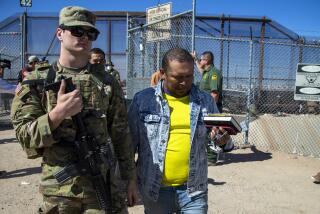Afghanistan: U.S.-led coalition formally ends 13-year combat mission
- Share via
Reporting from Kabul, Afghanistan — International military forces formally ended their combat mission in Afghanistan on Sunday after more than 13 years even as deadly violence continued in parts of the country.
The U.S.-led coalition known as the International Security Assistance Force lowered its green and white flag at its Kabul headquarters at 2:22 p.m. in a small ceremony marking the transition to a smaller mission focused on training and counterterrorism.
In a statement, NATO Secretary-General Jens Stoltenberg said the 40-nation coalition was not “walking away” from Afghanistan when its combat mission officially expires Wednesday.
“As we complete the international combat mission at the end of 2014, we open a new chapter in the relationship between NATO and Afghanistan,” Stoltenberg said. “The security of Afghanistan will be fully in the hands of the country’s 350,000 Afghan soldiers and police.”
In reality, the conflict in Afghanistan is far from over and international troops will still be involved in fighting. More than 12,500 foreign troops, including some 10,800 U.S. service members, will remain in the country under a new mission, dubbed Resolute Support, and are expected to gradually withdraw by the end of 2016.
U.S. troops will still be authorized to conduct airstrikes and provide other limited combat support to Afghan forces under orders approved by President Obama to help fight a Taliban-led insurgency that has demonstrated its strength with a series of major attacks in recent weeks.
The new mission will consist of troops from 28 NATO allies and 14 partner nations.
In a statement issued Sunday, Obama said the Kabul ceremony “marks a milestone” for the U.S., adding that “the longest war in American history is coming to a responsible conclusion.”
In thanking troops and their families for their sacrifiices, the president also warned that “Afghanistan remains a dangerous place, and the Afghan people and their security forces continue to make tremendous sacrifices in defense of their country.”
Speaking in Kabul, Mohammad Hanif Atmar, President Ashraf Ghani’s national security advisor, thanked the foreign troops for their service since December 2001, when the United Nations Security Council established the international coalition following the Sept. 11, 2001, terrorist attacks on the United States. Some 3,500 foreign troops have been killed in Afghanistan, including 2,224 American service members, according to a tally by the Associated Press.
“You have supported us in building the Afghan National Security Forces from nothing,” Atmar said. “Now they lead, holding their own against common enemies.”
In September, Atmar signed a bilateral security agreement with the United States and a status of forces agreement with NATO that paved the way for the residual forces to remain. Former President Hamid Karzai had refused to sign the agreements, even though they had been endorsed by a gathering of more than 2,500 representatives from across the country. At the time, Karzai said Washington had not done enough to curb Afghan civilian casualties.
U.S. Gen. John Campbell, who has led coalition forces since August and will remain in command of the new mission, said he was hopeful for the future of Afghanistan and called on insurgents to “heed President Ghani’s call, lay down their arms, [embrace] peace, and help rebuild the Afghan nation.”
The ceremonial end of the combat mission comes at a difficult time for Afghanistan. The Ghani administration is still mired in negotiations over forming a cabinet, 90 days after taking office. Casualties among the Afghan security forces have surpassed 4,634 this year – a record high, according to coalition statistics -- and the United Nations has recorded 9,617 civilian deaths and injuries.
Attacks in eastern and northern Afghanistan on Sunday further spoiled officials’ efforts to stage a clean handover.
Two civilians were killed and two more injured in a bomb blast in Alengar district of Laghman province in the east, provincial officials said.
Elsewhere in the east, one woman and four children were killed in a bombing in Khost province while a magnetic bomb attached to a police vehicle in Kabul injured three provincial officials from Wardak province, just outside the capital. The Taliban claimed responsibility for the blast in Kabul.
In the northern province of Balkh, police officials reported two civilians injured after a suicide bomber rammed his explosive-laden motorcycle into a police vehicle.
Afghan officials accused the coalition of killing five civilians in an airstrike in Logar province on Friday. Afghan news media said coalition officials apologized for the incident, saying it was the result of faulty intelligence.
The Taliban, who have led a violent 13-year resistance against what they call foreign occupiers, did not immediately issue a statement on the end of the combat mission.
Latifi is a special correspondent.
More to Read
Sign up for Essential California
The most important California stories and recommendations in your inbox every morning.
You may occasionally receive promotional content from the Los Angeles Times.










